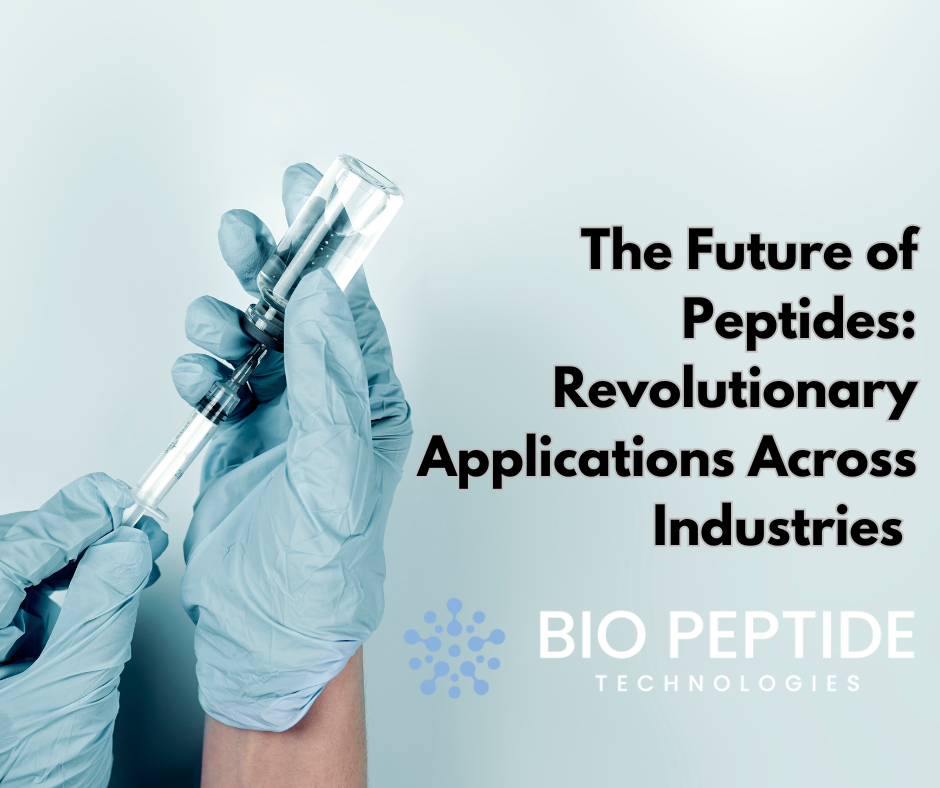
The Future of Peptides: Revolutionary Applications Across Industries
The Future of Peptides: Revolutionary Applications Across Industries
Peptides are at the forefront of a technological and scientific revolution. As versatile and highly customizable molecules, their potential extends into medicine, agriculture, biotechnology, and beyond. This expanded exploration provides a detailed look into each area, showcasing functional takeaways and their potential to transform our lives.
1. Advanced Therapeutics for Chronic Diseases
Applications:
- Targeted Cancer Therapies: Peptides can be conjugated with cytotoxic drugs to deliver treatment directly to cancer cells. Peptide-drug conjugates (PDCs) have shown promise in reducing side effects compared to traditional chemotherapy.
- Neurodegenerative Diseases: Peptides that mimic neurotrophic factors could regenerate damaged neurons, while others may prevent the aggregation of toxic proteins like amyloid-beta in Alzheimer’s disease.
- Autoimmune Conditions: Immune-modulating peptides could selectively suppress autoimmune activity while preserving the immune system’s ability to fight infections.
Takeaway:
Peptides enable precision medicine by targeting disease mechanisms at the molecular level, paving the way for safer, more effective treatments for complex diseases.
2. Regenerative Medicine and Anti-Aging
Applications:
- Skin Health: Topical peptides like GHK-Cu are being explored for their ability to reduce wrinkles, improve skin elasticity, and repair UV damage. Injectable peptides may soon provide deeper skin rejuvenation.
- Tissue Engineering: Peptides could scaffold cellular growth for organ repair or replacement, offering alternatives to donor organs.
- Longevity Research: Peptides like MOTS-c are being studied for their role in mitochondrial health, potentially slowing the aging process by improving cellular energy production.
Takeaway:
Peptides are redefining anti-aging and regenerative medicine by addressing the root causes of cellular and tissue damage, offering holistic and targeted solutions for longevity.
3. Revolutionizing Vaccines and Drug Delivery
Applications:
- Peptide-Based Vaccines: Unlike traditional vaccines that use whole pathogens, peptide vaccines focus on specific epitopes, reducing the risk of adverse reactions and enabling rapid development against emerging diseases.
- Smart Drug Delivery Systems: Peptides engineered to cross the blood-brain barrier are unlocking treatments for previously inaccessible neurological conditions, such as glioblastoma and epilepsy.
Takeaway:
Peptides are advancing vaccine development and drug delivery, offering precision, safety, and accessibility for global healthcare challenges.
4. Applications in Agriculture and Food
Applications:
- Crop Protection: Antimicrobial peptides (AMPs) can target specific pathogens without harming beneficial microorganisms, promoting sustainable farming.
- Animal Health: Peptides can replace growth hormones and antibiotics in livestock, reducing the risk of antibiotic resistance.
- Food Preservation: Peptide-based coatings or additives could prevent spoilage by targeting microbial growth, extending the shelf life of perishable goods.
Takeaway:
Peptides are transforming agriculture and food production by enhancing sustainability and reducing reliance on harmful chemicals.
5. Enhancing Sports and Human Performance
Applications:
- Muscle Growth and Recovery: Peptides like IGF-1 and CJC-1295 promote anabolic processes, while BPC-157 aids in healing injuries by enhancing blood flow and collagen synthesis.
- Cognitive Performance: Nootropic peptides (e.g., Semax) modulate brain-derived neurotrophic factor (BDNF) levels, improving memory, focus, and resilience to stress.
- Endurance Enhancement: Peptides targeting mitochondrial function improve energy production, reducing fatigue during prolonged physical activity.
Takeaway:
Peptides are optimizing physical and mental performance, offering biohackers and athletes tools to achieve peak potential safely and effectively.
6. Tackling Antimicrobial Resistance
Applications:
- Infection Control: Antimicrobial peptides (AMPs) like defensins and cathelicidins disrupt bacterial membranes, offering a solution against drug-resistant pathogens.
- Wound Healing: AMPs integrated into wound dressings prevent infections while promoting faster tissue regeneration.
- Broad-Spectrum Applications: AMPs are being explored to combat fungal infections, biofilms, and even certain viruses like influenza.
Takeaway:
Peptides provide a sustainable and effective response to antimicrobial resistance, potentially reducing dependency on traditional antibiotics.
7. Peptides in Biotechnology and Nanotechnology
Applications:
- Peptide-Based Biosensors: Functionalized peptides detect specific molecules, enabling real-time diagnostics for diseases like diabetes or early-stage cancer.
- Nanocarriers for Drug Delivery: Peptides self-assemble into nanoparticles, protecting drugs from degradation and ensuring controlled release at the target site.
- Synthetic Biology: Peptides can be engineered into biomaterials for use in prosthetics, drug screening platforms, and tissue regeneration scaffolds.
Takeaway:
Peptides are key players in the biotech revolution, offering solutions that bridge biology and technology for innovative applications.
8. Peptides in Mental Health and Addiction Treatment
Applications:
- Rapid-Acting Antidepressants: GLYX-13 (Rapastinel) is a peptide that acts on NMDA receptors, providing fast relief from depression without traditional side effects.
- Addiction Recovery: Peptides like oxytocin analogs are being investigated for their ability to reduce cravings and enhance emotional regulation in recovering individuals.
- PTSD and Anxiety: Peptides such as Selank modulate stress responses, potentially offering non-addictive alternatives to benzodiazepines.
Takeaway:
Peptides offer innovative approaches to mental health treatment, targeting underlying neurochemical imbalances for faster and more sustainable results.
What the Future Holds
The peptide revolution is just beginning, and its applications are limited only by the boundaries of our imagination and research capabilities. Whether in medicine, agriculture, sports, or technology, peptides promise to unlock new possibilities that will enhance quality of life and address some of humanity’s most pressing challenges.
By investing in peptide research and embracing their potential, industries and individuals alike can look forward to a future where these versatile molecules redefine innovation across every field.
Are you ready to join the peptide revolution? Stay informed, stay innovative, and discover how these powerful molecules can transform the future.

Leave a comment